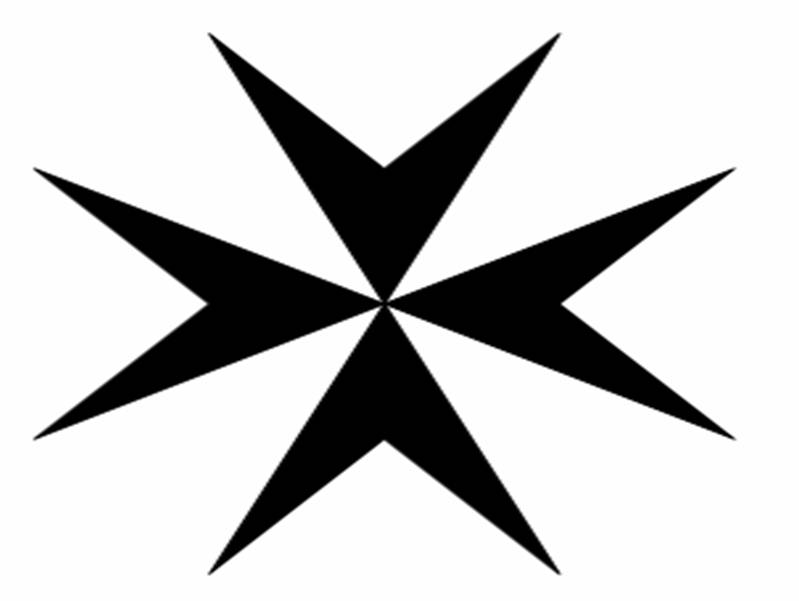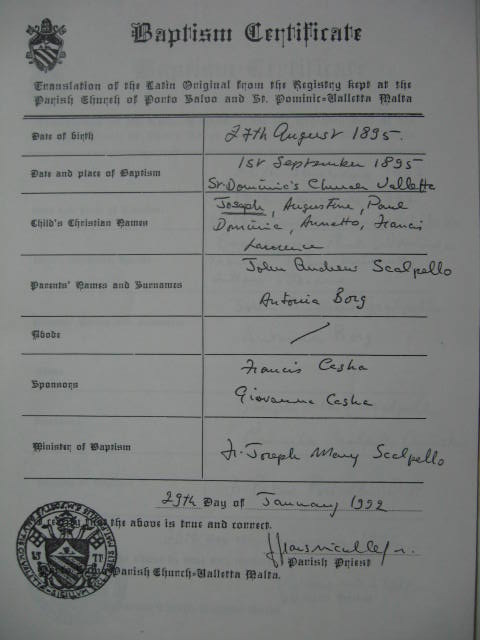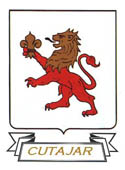





By Ray Cutajar
|
|
Father Francis Scalpell was born in Malta on 27 th August 1895 at 62, St.Nicholas Street, Valletta. He was baptised in St. Domenic's church on 1 stSeptember 1895 by his own uncle, Father Joseph Mary Scalpello and was christened Joseph. Later in his life, he adopted the name 'Francis', probably because he had initially been a franciscan monk. His surname was Scalpello, but when he went to Wales he adopted 'Scalpell', as this fitted better in the community where he lived for so many years during the latter part of his life.
 The house where he was born still exists and is just around the corner from Valletta's St.Domenic's church. His parents were Giovanni Andrea and Antonia (nee' Borg) Scalpello. Joseph was the third born in a family of six children. He had two brothers, Paolino and Emmanuel and three sisters: Maria Josepha, who died in 1897 aged three years 10 months; Carmela, who died in 1894 aged just four months; and Maria Carmela. Father Scalpell's father, Giovanni Andrea, was employed as a marshall at the Maltese Law Courts. One may say that that the Scalpello family came from the medium class of the late 19th century Maltese society. Although the father's salary was by no means high, he could afford to educate his children and initiate them in arts and music, in which he himself excelled. In 1897 the family moved from Valletta to a rented house at Prince of Wales Road, in Sliema, in the (then) Stella Maris parish. Here Paolino and Maria Carmela were born in April 1898 and July 1900 respectively. In 1905, when little Joseph was just under ten years old, his father Giovanni Andrea caught a very severe cold, while returning home from work on a stormy April evening. He used to take the 'Lanca' (open boat) to cross Marsamxetto Harbour from Valletta to Sliema. After just three days, on 30 April 1905, he died at the age of 51, leaving a very shocked family after him. The children were still all small enough to hide under their mother's Ghonnella (a kind of wide black mantle, stiffened wth cardboard and baleen, worn by most women during those times). The Scalpello family, bereaved of their breadwinner, were left with no financial income. Fortunately, little Joseph's godfather, Francis Casha, stepped in to help. Casha was a wealthy man by the standards of those times, and had started his business by exporting embroideries to Greece. He became a thriving businessman and owned the Great Britain Hotel in Kingsway (now Republic Street), Valletta, opposite the Royal Opera House (blitzed 1942), together with many large properties in Valletta (South Street), Sliema and Floriana. Francis Casha was willing to support the Scalpellos, to whom he was actually related; he was the cousin of Mrs Scalpello's father. In turn, Mrs Scalpello started assisting him in his business. Francis Casha started paying for Joseph's education. The boy started attending the Freres school at Villa Schinas, Rudolph Street, Sliema. Afterwards, he moved over to St.Aloysius Jesuit College in Birkirkara, which at the time was one of the best schools on the island. Similarly, Joseph's brothers and sister continued to be well educated and cared for by Francis Casha, who, although he was a bachelor, assumed a paternal role in the Scalpello family. As a little boy, Joseph was very lively and active. Although his father's death was a major blow to him, it did not stunt the development of his character and talents. He loved studying and reading and this occupied a major part of his time. He attended music lessons and eventually learned to play the piano, the organ and the violin. Joseph also loved architecture and art studies, which his father had also loved. Little Joseph liked playing 'the shoemaker' with his family's shoes, and Francis Casha would gently chide him about this and tell him that he wanted him to become more important than a mender of soles. However, Joseph had a much grander dream in his deep heart's core: he wanted to become a Mender Of Souls. His greatest passion was to play the priest with his brothers and sister and he made a little altar in his room, complete with candlesticks and a white embroidered cloth which his aunt Mimi` made especially for him. Joseph dreamed of becoming a priest and of building not just an altar, but a church for his flock. His niece May clearly remembered him telling her that the building of the Dolgellau church was a realisation of his fervent childhood dreams. In this respect, Joseph was also influenced by his uncle, Father Joseph Mary Scalpello, who encouraged the boy's ardent fervour for religious matters. Unfortunately, this uncle just missed seeing his nephew take Holy Orders, since he died just before the ordination, aged 51, on 22 nd August 1920 at 138, Strada Reale, Gudia, where he lived with his unmarried sister Carmela. Joseph's brothers and sister were also being well educated. Emmanuel loved music and arts, and started writing poems, plays and short stories. He eventually married Marianna Taylor at St.Julian's parish, and had one daughter, May. Paolino wanted to become a businessman and eventually he succeeded in acquiring a business at Hamrun. At the age of 55, he finally married Margaret Briffa on 4th November 1953. Young Maria Carmela had a quiet temperament and remained unmarried until she died in June 1933 aged just 33 years. |
